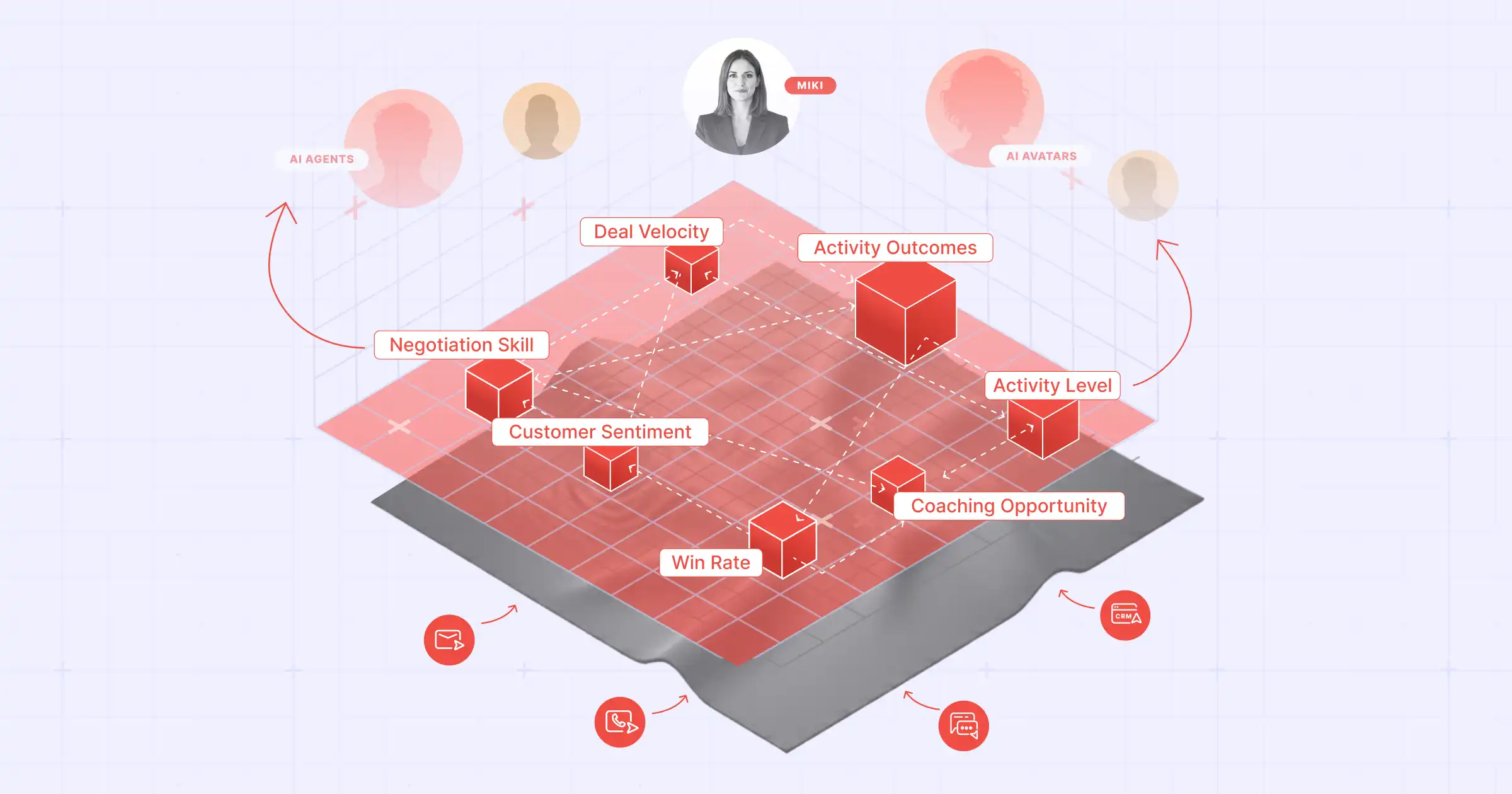Sales Coaching: Building Your Team Up for Success
Apr 13, 2021
Behind every successful athlete is a great coach, and behind every successful sales team is a great sales manager. In this article, we walk through 5 sales coaching strategies to elevate your team’s sales performance.
Sales coaching
Sales coaching is the activity of increasing sales readiness in reps or teams by motivating long-term behavioral changes towards short-term quantifiable results.
Sales coaching is often overlooked in the busy schedule of a sales manager. Nonetheless, sales coaching remains a critical component in the role of a sales manager: with effective coaching, managers have the opportunity to empower reps, guide personal development, and drive better results. Again and again, sales coaching has proven ROI. These studies by CSO Insights and SRG both demonstrate a strong correlation between sales coaching and quota attainment, and this study by ICF shows a 700% median company return on coaching investments. Despite the overwhelming evidence for the benefits of sales coaching, it can still be mysterious and daunting to initiate. Where do you start? What approach should you take? How do you know whether your coaching is actually working?As effective sales leaders know, sales coaching is both an art and a science.Modern sales coaches with high-performing teams are empathetic and motivational. At the same time, sales coaches must be experienced, data-driven, and knowledgeable in how to tailor their coaching for each seller depending on the seller’s level of expertise. Ready to get started on becoming a great sales coach? Here are 5 research-backed strategies used by high-performing managers to guide their teams to sales success.
1. Implement an Incentive System
When it comes to motivating behaviors, instantaneous positive feedback is much more likely to be effective than punishments or threats.

Get creative with activities and incentives to build positivity and motivate your team. Send personal notes, present an award, or make an announcement acknowledging team members for their contributions and effort, both as individuals and as a collective. On a more general level, it’s important to establish and communicate a commission structure in your sales organization that is clear, transparent, and up-to-date.One option you might consider is a tiered commission hierarchy, which provides a sense of competition and accomplishment as reps move up tiers. Under this structure, commission rate increases as a rep reaches a certain minimum of a sales metric, such as deals closed or revenue brought in.
2. Coach Rep Performance with Data
When you find that a rep is performing poorly compared to the rest of your team, your first response might be to shadow them to try and figure out what’s going wrong.Although shadowing can be helpful, it can only show part of the equation. Supplement your shadow session with a deep dive into the data you have available from your CRM or sales analytics software.

Tools such as rep scorecards, deal reports, and call transcriptions can give you a better perspective into the specific actions your rep is taking and the conversations they’re having. Additionally, you can also use these tools to get insight into the behavior of your top-performing reps. Derive tactics for success and turn them into coachable moments to be shared with your entire team when you spot an opportunity. On a different note… wouldn’t it be great if you could automatically analyze rep activities and generate data-based suggestions for improvement?
3. Ask the Right Questions
When looking for patterns of seller success or potential improvement in your data, come prepared with focus questions in mind -- most importantly, how you can coach your rep to develop new and existing skills to improve their performance.

If you’re looking through call transcriptions, you might ask: do they need coaching on how to build trust with prospects? If your rep keeps on forgetting to qualify buyers, do they need to set up a nudge system to keep them on track? If your rep is ignoring forecasts and going ahead with risky deals, what can you do to divert this energy?Use this data to prepare for sales coaching meetings so that you aren’t wasting time asking questions that might lead to defensive answers or confusion on the part of your rep.The more you know beforehand, the better you can tailor the discussion, and the more productive your conversations will be.
4. Leverage Outside Resources
Although the world of sales is vast, it can be easy to get stuck in a sales-centered bubble. As a sales manager, you likely have access to a wealth of valuable resources, including connections to the marketing or customer relations departments. Leverage these connections to gain information and knowledge your reps will need to succeed. Customer FAQs, to be included in a demo
Here are some examples of resources you might reach out for:
Top customer or user complaints, to prep for objections
A curated selection of customer stories, to send in follow-up emails
5. Listen to Your Team
Sometimes, sales coaching involves taking a step back. Encourage your reps to tell you what exactly they’re struggling with. This might be something that can’t be gleaned from the data, or may be a side effect of a larger issue.Overall, allowing your reps to disclose their concerns can help you better assess your reps’ strengths and weaknesses and better understand how to coach them. At the same time, taking a step back can mean trusting your team to teach themselves. Schedule a meeting to ask them to share with one another what’s working and what’s not. Evidence shows that we place a lot of value in the words of our peers, and it might turn out that one of your reps learns better by listening to other reps in the field. Ask your top performers to speak about their successes and failures, and listen in on their stories. Encourage your low performers to speak as well -- they might have some surprising insights!

Use this to build a sales playbook for success, complete with winning tips and tactics to close deals faster and more effectively. (Ensure that you have an effective meeting with call recordings & transcriptions, speaker highlights, and talk-to-listen ratio.) Don’t forget: no one becomes an expert sales coach overnight. Like any other activity, it takes work and dedication and a lot of trial and error -- but will be incredibly rewarding if you pull it off. That is to say: if you put in the elbow grease, you’ll see the results! Ready to put these strategies into action?
Learn more about Aviso’s AI-Guided sales coaching model or contact us today to see how we can help you and your team drive sales readiness.







